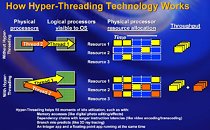Monday, June 26th 2017

Critical Flaw in HyperThreading Discovered in "Skylake" and "Kaby Lake" CPUs
A critical flaw was discovered in the way Intel implemented its simultaneous multi-threading technology, HyperThreading, on "Skylake" and "Kaby Lake" processors. Being a micro-architecture specific flaw, this could affect all implementations, from low-power mobile chips, to mainstream desktop, high-end desktop, and perhaps even enterprise-segment Xeon processors. At this time, there are no security implications of this flaw.
Intel chronicled this flaw in its micro-architecture errata "SKZ7/SKW144/SKL150/SKX150/SKZ7/KBL095/KBW095," and described it as follows: "Under complex micro-architectural conditions, short loops of less than 64 instructions that use AH, BH, CH or DH registers as well as their corresponding wider register (e.g. RAX, EAX or AX for AH) may cause unpredictable system behavior. This can only happen when both logical processors on the same physical processor are active." As an implication, Intel goes on to note that Due to this erratum, the system may experience unpredictable system behavior."The HyperThreading flaw can be fixed through a micro-code update distributed as a UEFI firmware update. Typically, it becomes the responsibility of DIY PC motherboard, pre-built desktop, and notebook manufacturers, to distribute the update. The issue first came to light in a Debian Linux user mailing-list, although it affects all PC operating systems, not just Linux. Support groups of Debian recommend disabling HyperThreading in the UEFI setup programs of your computers as a temporary workaround, till the micro-code patch is applied. Disabling HyperThreading will reduce performance in multi-threaded apps.
Source:
Debian Mailing List
Intel chronicled this flaw in its micro-architecture errata "SKZ7/SKW144/SKL150/SKX150/SKZ7/KBL095/KBW095," and described it as follows: "Under complex micro-architectural conditions, short loops of less than 64 instructions that use AH, BH, CH or DH registers as well as their corresponding wider register (e.g. RAX, EAX or AX for AH) may cause unpredictable system behavior. This can only happen when both logical processors on the same physical processor are active." As an implication, Intel goes on to note that Due to this erratum, the system may experience unpredictable system behavior."The HyperThreading flaw can be fixed through a micro-code update distributed as a UEFI firmware update. Typically, it becomes the responsibility of DIY PC motherboard, pre-built desktop, and notebook manufacturers, to distribute the update. The issue first came to light in a Debian Linux user mailing-list, although it affects all PC operating systems, not just Linux. Support groups of Debian recommend disabling HyperThreading in the UEFI setup programs of your computers as a temporary workaround, till the micro-code patch is applied. Disabling HyperThreading will reduce performance in multi-threaded apps.

98 Comments on Critical Flaw in HyperThreading Discovered in "Skylake" and "Kaby Lake" CPUs
As for OEM machines, I've looked at many OEM systems and most if not all of them use the cheapest stuff you can find. Cheap RAM, cheap PSU, etc. The kinds of stuff that I wouldn't be caught dead buying and putting into my system.
What AMD does is irrelevant. Claiming more transparency from Intel than AMD is bullshit too.
Intel has not contacted with the Ocaml compiler developers who found that the problems they were having were rooted to Intel processors. That is shoddy behaviour.
As for processors with faults, yes, they all have bugs. Processor design, as of today, has much in common with software design.
OEMs don't sell brand RAMs and cards with aftermarket water loops, they sell systems that work without the consumer bothering to assemble or maintain them. That's a completely different deal that what you get with DIY systems.
linustechtips.com/main/topic/788732-ryzen-segmentation-faults-when-compiling-heavy-gcc-linux-loads/
Only upgrade Im thinking about is liquid cooling. :D
Seriously though, I'm jumping on the Ryzen train as soon as the end of the year... or next year...
What about the 13 or more bugs in the AMD errata PDF I posted? I can go back in the TPU news articles and I can't seem to find any of the corresponding pitchfork threads.
How do you know? I mean you can clearly see the errata document for intel WITH the corresponding code that identifies that particular bug which was amended in via date stamp just this month.
not that HT is technically useful... for gaming ... (sometime it's even an hindrance :p )
And did you know no OEM board maker would even think about using RGB lightning?
And "properly put together" is an interesting term here. Is there such a thing as an "improperly put together" computer? No. Well, cooling can be improperly mounted and cables can have poor contact, but on the whole a computer is like IKEA furniture, just way, way easier to assemble. We don't build our own circuit boards. Most computer "enthusiasts" can't even solder; where's the damned heroism in that? Look I got eight different components and I managed to put them together in a system which does not allow things to be connected wrong unless I use saws and hammers! I am Hero, I AM SUPERIOR. I know what my graphics card is called; KOWTOW. I run memory at a specified speed; KNEEL. I have a motherboard with heatsinks that looks like things and it is black and red and surrounded by light and I can run my circuits faster than they are sold to me as; I AM THY GOD. My case is a tower of black perfection, designed by someone and made in China; I AM THE OFFSPRING OF HE-MAN AND WONDER WOMAN, I AM MASTER OR THIS UNIVERSE AND THE NEXT.
This turned out to be a bit of a rant I think.
Wouldn't be surprised if most don't release updates because it's not a security issue.
I use this tool to update my CPU Microcode Automatically to latest which is Version BA !
Enjoy
www.win-raid.com/t154f16-Tool-Guide-News-quot-UEFI-BIOS-Updater-quot-UBU.html